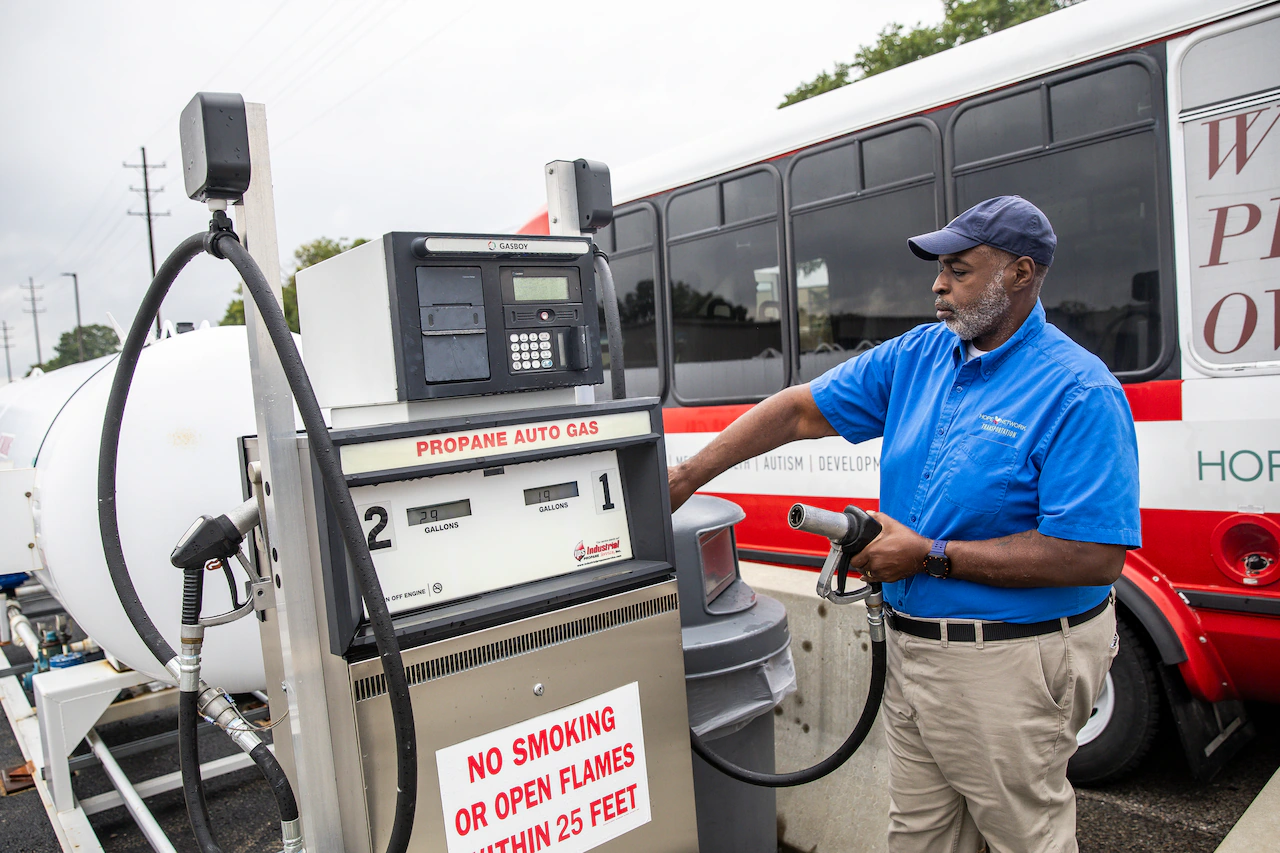
GRAND RAPIDS, MI — A fleet of red Hope Network buses idles outside the Amway Grand Plaza Hotel in Grand Rapids, ready to take Ms. Wheelchair America contestants out on the town.
The unassuming transports look like any other fully accessible bus, but reports highlight a statewide trend toward the vehicles’ clean emission and quiet hum.
Hope Network Transportation is one of several transit agencies recognized for revolutionizing community transit in Michigan with a growing propane-powered fleet that provides critical mobility services to people in need.
There are about 500 propane transit buses deployed across more than 15 agencies statewide, according to Roush CleanTech, a Livonia-based company responsible for designing and building propane engine systems.
“Our state’s transit agencies are demonstrating confidence in propane autogas as a reliable and environmentally friendly fuel option for their fleets,” said Todd Mouw, executive vice president for ROUSH CleanTech, in a news release statement. “With the support of Roush engineering and our commitment to sustainability, Michigan is leading the charge toward a greener, more cost-efficient transit future.”
The Rapid bus system, which serves Grand Rapids and its suburbs, operates demand-response services for people with disabilities beyond its fixed routes, is another transit company in Grand Rapids using propane to serve riders.
“Not only does propane work in our climate, but the vehicles also have similar engine to gasoline engines,” said Steve Schipper, chief operating officer of The Rapid, in a news release statement. “It is also important that propane is a domestic fuel produced here in the United States, supporting American jobs and reducing dependency on foreign oil.”
An expanding propane-powered fleet has become intertwined with Hope Network’s mission to serve its community. Of the organization’s 92 vehicles, 47 are currently propane-powered with two more on the way.
Jason Ulanowicz, transportation director for Hope Network, said environmental and economic benefits are substantial.
The propane vehicles offer numerous advantages, including cleaner emissions, reduced maintenance costs, and better cold-weather performance, he said.
The company burns from 55,000 to 65,000 gallons of propane and puts more than 2 million miles on its vehicles each year.
“I can buy 3 gallons of propane compared to 1 gallon of gasoline,” said Ulanowicz, who previously managed service facilities specializing in fire truck repair. “Propane is really good for the engine. It burns hot.”
Quite frankly, keep them oiled and they’ll go,” he added.
Ulanowicz said the West Michigan-based organization operates five distinct service lines to meet diverse community needs. Services include its RideLink and Wheels to Work programs.
“I can serve more, because propane is a more effective and efficient fuel. And with the price I can get it for, I’m able to serve more of the community,” Ulanowicz said. “But I can also act as a good manager of the environment for the community.”
Hope’s RideLink program provides transportation for adults over 60, primarily for medical appointments but also for everyday activities like grocery shopping, salon visits, and social outings.
Wheels to Work is a collaboration between Hope and employers. The program helps businesses reduce turnover and gain a hiring advantage.
Hope Network also coordinates group trips for nursing homes, provides specialized services for residents with special needs in Kent County, and offers a prepaid program that allows seniors to schedule rides on weekends for activities like attending church.
”This summer when we had all those ozone awareness days, it wasn’t because of my vehicles,” Ulanowicz said. ”We’re very proud of that. Hope Network aims to serve our community in any way we can, and that means doing what’s best with our vehicles.”
Hope Network’s transportation system operates 24/7, 365 days a year, with routes averaging over 300 miles daily. The organization’s iconic red buses continue their mission of community service, now with cleaner, more efficient propane power.
“Not only can I serve more of the community, but I can also act as a good manager of the environment for the community,” Ulanowicz said. “That is the overall mission of Hope. Hope is to serve our community in any way we can.”



